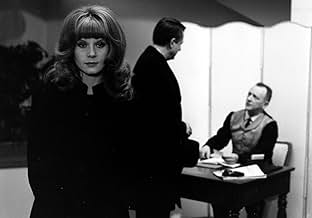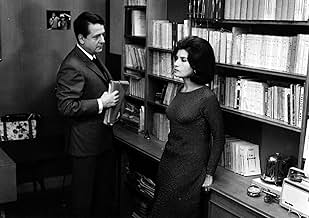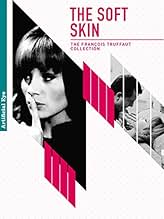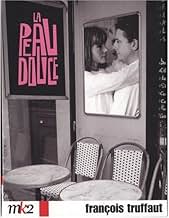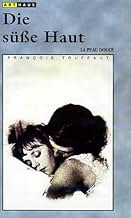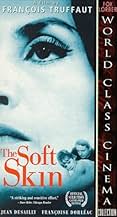Pierre Lachenay è un noto editore e docente, sposato con Franca e padre di una ragazzina di dieci anni di nome Sabine. Conosce una hostess, Nicole, e iniziano una storia d'amore, che Pierre ... Leggi tuttoPierre Lachenay è un noto editore e docente, sposato con Franca e padre di una ragazzina di dieci anni di nome Sabine. Conosce una hostess, Nicole, e iniziano una storia d'amore, che Pierre nasconde, ma non sopporta di starle lontano.Pierre Lachenay è un noto editore e docente, sposato con Franca e padre di una ragazzina di dieci anni di nome Sabine. Conosce una hostess, Nicole, e iniziano una storia d'amore, che Pierre nasconde, ma non sopporta di starle lontano.
- Regia
- Sceneggiatura
- Star
- Premi
- 1 vittoria e 2 candidature totali
- Nicole
- (as Françoise Dorleac)
- Lisbon organizer
- (non citato nei titoli originali)
- Le père de Nicole
- (non citato nei titoli originali)
- Jeune fille Reims
- (non citato nei titoli originali)
- Mme. Leloix
- (non citato nei titoli originali)
- Veilleur hôtel Michelet
- (non citato nei titoli originali)
Recensioni in evidenza
I believe this film is deeply personal for Truffaut. He has several films about male protagonists who cheat on their wives or girlfriends (Bed and Board and The Man Who Loved Women, for example). What I like best about The Soft Skin is precisely that the affair happens because the stewardess is impressed to get involved with a minor celebrity, and he sleeps with her mainly because he can. They don't "fall in love" with each other; it's an adultery story, not a love story. Because the emotional involvement of the characters isn't very great, neither is the involvement of most of the audience. I will infer that Truffaut had more than one fling like this, but had no insight into why he did this. The subject is personal, but nothing about the presentation helped to alleviate that paucity of engagement.
Two other points: 1) Truffaut's films tend to be very one-paced. They don't usually quicken, slow down, speed up, etc. They proceed pretty much at the same pace from beginning to end. This is a real limitation. 2) I have come to believe that as much as Truffaut loved Hitchcock's films, as a director he learned absolutely nothing from him. Hitchcock is a master of pacing. The best moments in Truffaut's films usually come from a realist aesthetic that is the opposite of Hitchcock's master manipulation of genre and audience.
Pierre is a married man. His wife is also a good-looking woman and he has a 10-year-old daughter that loves him (as does his wife). Pierre is an intellectual with an organized life, maybe having had some flings here and there, but nothing that really threatened the comfortable foundations of his life. But now he has met Nicole. And Nicole represents everything that Pierre had never really experienced before: she has a real "joie de vivre" but underneath it, there is pain, and above all, strength - the strength to overcome sadness and start all over again, that is, to live right here and now.
Pierre, on the other hand, as an intellectual, lives a life of compromises. His wife, Franca (Nelly Benedetti), loves him and has a strong personality. She knows exactly what she wants and is determined to fight for it. Pierre is between two strong women. He loves Nicole - she has opened a new life, a new world for him. Will he follow his heart? And where will his heart lead him? I think that "La Peau Douce" is one of the more personal films made by Truffaut. It has a psychological subtlety not displayed in his later works (be it his later Antoine Doinel films, his literary adaptations, or his homages - to Hitchcock, Jean Renoir etc..). Never again would Truffaut reach the depth of "La Peau Douce".
"La Peau Douce" reveals understanding (and tenderness) for all the characters, but alongside these traits there's also a bitter irony and even some touches of dark comedy. The characters are shown in all their weaknesses and beauty. In later Truffaut films the tenderness would be the prevailing feature - the irony would come along in a watered-down form.
1. The main character is not very likeable; he's almost completely expressionless even though this is a love story. 2. Certain events happen in a way that isn't exactly realistic: an elevator takes nearly 2 minutes to travel up 5 floors but only 15 seconds on the way down. 3. Certain events happen without any dialogue or explanation, just a succession of close ups showing objects and activity. But these 3 points are very deliberate, and they are what make "La peau douce" such a tremendous work of art.
1. Why is the main character not likeable? As Truffaut said, this film is "an autopsy of adultery". The story is about a respectable man with a meticulously perfect life who engages in a very imperfect affair. Truffaut wanted to present everything as objectively as possible so that we can analyze all the elements without the prejudice of sentimentality. So he made the lead actor Jean Desailly play the role of "Lachenay" with neutrality; we sense deep emotion, but there are no melodramatic scenes of outward expression as we've come to expect in love stories. If you think about it, isn't that how most people's love lives are? We don't usually get dramatic closeups with soft lighting and complimentary filters. An objective observer woudn't necessarily sympathize with what we're feeling but rather would scrutinize our actions & choices. And as far as that goes. Lachenay makes some pretty bad ones.
2. How realistic is the storytelling? At times, not very. But this style is one of the greatest examples of "hyper realism" which is something Truffaut learned from his mentor and idol Alfred Hitchcock. For example in the elevator scene, time is stretched on the way up, intensifying the first meeting between Lachenay and Nicole (excellently played by Françoise Dorléac, the carefree, outgoing sister of Catherine Deneuve). Only a handful of words are said, but in true Hitchcockian form it's a very suspenseful and portentous scene that deserves its full 2 minutes. The same elevator ride down, with Lachenay alone, is designed to give us contrast and return us to the realistic world as the 5-floor descent is shown in real time, only 15 seconds.
3. Dude where's the dialogue? It's there, but sometimes it's conspicuously absent like in the entire seduction scene which consists of a wordless walk down a hotel hallway, a fumbling for some keys, a lingering stare, hands touching as a door is opened, one hand turning on the light while another hand turns it off, and finally a magnificent dark silhouette of 2 people facing each other. Fade to black. Did we really need any dialogue to understand exactly what was going on in their heads? No, we didn't even need any facial expressions. Again drawing an idea from his hero Hitchcock, even taking the idea into new territory, Truffaut fully embraced the idea of image based storytelling. (In his letter of introduction to Hitch, Truffaut closed by saying that if all movies were suddenly silent again, then Hitchcock would prove himself the greatest storyteller of all time.)
A quick note about the ending (NO SPOILERS) because half a dozen other reviewers seem to have a problem with it: Um you guys realize that the ending was taken from an event that actually happened in real life, right? Look it up (AFTER the film)!
There are so many other gems in this film worth mentioning, but my review would drag on for hours, and that time is better spent with you experiencing this flick firsthand. Audiences of 1964 hated it, but now looking back some 70 years, we realize that "La peau douce" is a masterpiece.
They could not have been more mistaken. Time has treated La Peau Douce better than most of his later efforts. It is definitely a triumph of direction with each scene being carefully planned and meticulously structured, not unlike a Hitchcock movie. In practice, Truffaut transposes Hitchcock's mechanisms of suspense into a seemingly trivial story concerning the illicit love affair of a distinguished editor/author with a younger stewardess and its withering consequences. The characters and the milieu of the story are effortless evoked, but the main joy is derived from the visual inventiveness that Truffaut shows in scene after scene. It's a triumph of a purely cinematic mode of expression, which Truffaut was one of the few who had really mastered it.
The love triangle would have been be trite,had not Truffaut focused on the cheated wife (Nelly Benedetti) ,an offbeat move.The end of the movie is hers ,at the expense of the late Françoise Dorleac's pretty girl character.And the scene in the street with the man who treats her like a whore is woman's lib before its time:"who do you think you are?take a good look at yourself! " this desperate woman screams.And the harsh conclusion heralds that of "la mariée était en noir" (the bride wore black).�
Lo sapevi?
- QuizThe scenes set in Pierre Lachenay's apartment were filmed in Truffaut's own home.
- BlooperPierre and Nicole are in a hotel elevator approaching the 8th floor, Pierre is on the right side. The following shot from outside the elevator shows Pierre on the opposite side.
- Citazioni
Pierre Lachenay: I've learned that men's unhappiness arises from the inability to stay quietly in their own room.
- ConnessioniFeatured in François Truffaut: Portraits volés (1993)
- Colonne sonorePierre Et Nicole
Written and Performed by Georges Delerue Et Son Orchestre
I più visti
- How long is The Soft Skin?Powered by Alexa
Dettagli
- Data di uscita
- Paese di origine
- Lingue
- Celebre anche come
- The Soft Skin
- Luoghi delle riprese
- Aziende produttrici
- Vedi altri crediti dell’azienda su IMDbPro
Botteghino
- Lordo Stati Uniti e Canada
- 509 USD
- Fine settimana di apertura Stati Uniti e Canada
- 11.206 USD
- 25 apr 1999
- Lordo in tutto il mondo
- 35.501 USD
- Tempo di esecuzione1 ora 53 minuti
- Colore
- Mix di suoni
- Proporzioni
- 1.66 : 1
Contribuisci a questa pagina


![Guarda Bande-annonce [OV]](https://m.media-amazon.com/images/M/MV5BYzY4NmVmYjItNzQ2MS00MDU4LThlODctYjliMTRhM2ZmY2MwXkEyXkFqcGdeQXRyYW5zY29kZS13b3JrZmxvdw@@._V1_QL75_UX500_CR0)
